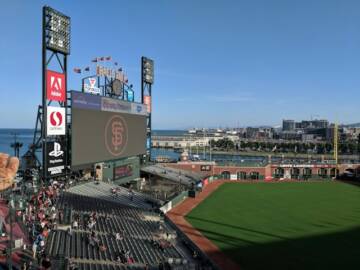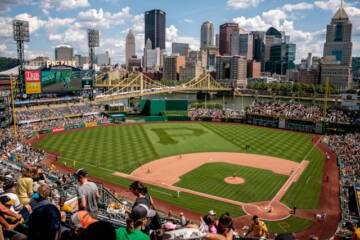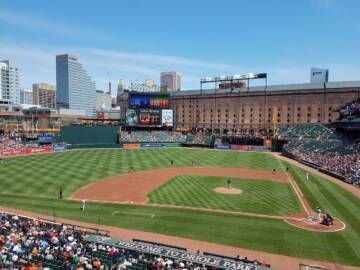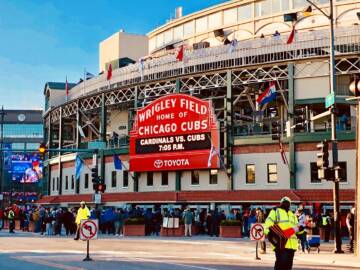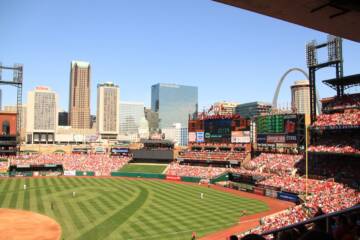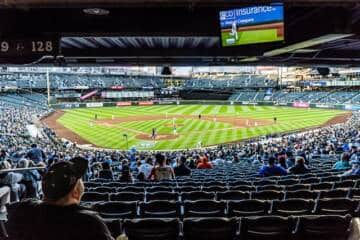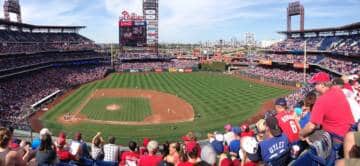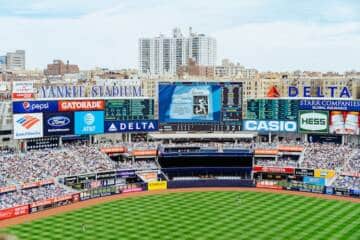The 10 Best MLB Stadiums
You’ve landed in the right spot if you’re a baseball fan who loves travel. We’re about to delve into the best MLB stadiums across America, each offering a unique blend of sport and culture.
Why the emphasis on stadiums? Each is a realm filled with traditions, quirks, and fans that make the game an unforgettable experience. You’ll want to add each of these gems to your must-visit list.
Best MLB Stadiums
Oracle Park, San Francisco Giants
Oracle Park, home to the San Francisco Giants, is a privately financed marvel that opened its doors on April 11, 2000. It was the first privately funded Major League Baseball stadium since Dodger Stadium in 1962. The park has undergone several name changes, starting as Pacific Bell Park and eventually becoming Oracle Park in 2019.
The stadium’s design is a nod to classic baseball parks, inspired by Wrigley Field and Fenway Park. It’s situated in the China Basin district, offering breathtaking views of the San Francisco Bay. The main grandstand consists of 41,600 green seats that stretch from behind home plate to the foul poles.
The park is known for its unique features, such as the 80-foot Coca-Cola bottle with playground slides and the world’s largest baseball glove. These are part of the Coca-Cola Fan Lot, an interactive area for fans of all ages. When a Giants player hits a home run, the Coca-Cola bottle comes alive with lights and bubbles, adding to the spectacle.
Willie Mays, one of baseball’s all-time greats, is honored with a nine-foot statue at the home plate entrance. The park also features McCovey Cove, named after Hall of Famer Willie McCovey, where Portuguese water dogs fetch home runs that make a splash.
The park has hosted significant moments in baseball history, including Barry Bonds’ 715th and 756th home runs and Matt Cain’s perfect game in 2012. It has also hosted the All-Star Game in 2007 and multiple World Series.
Getting to Oracle Park is easy, thanks to excellent public transit options in San Francisco. The park even has a sidewalk along the right field fence, allowing fans without tickets to catch a glimpse of the action.
Regarding upgrades, the Giants installed one of baseball’s largest 4K video boards before the 2019 season. The board covers 10,700 square feet, three times the surface area of the previous one. The bullpens were also moved from the field to behind the center field fence, reducing the park’s seating capacity by about 650 seats but improving player safety.
PNC Park, Pittsburgh Pirates
PNC Park is a baseball fan’s dream, blending modern amenities and old-school charm. Opened in 2001, it’s the fifth home for the Pittsburgh Pirates, and it’s a far cry from their previous digs at Three Rivers Stadium. The park is cozy, with a seating capacity of just 38,362, ensuring every fan gets a great view of the action.
The park’s location is a stunner, sitting right along the Allegheny River. The Roberto Clemente Bridge and the Pittsburgh skyline are the perfect backdrop for a game. On game days, the bridge is closed to cars, turning the area into a bustling hub of activity.
The architecture is a nod to the past, featuring a limestone facade, terra cotta tiled pilasters, and dramatic masonry arches. The flat green steel roof adds a modern touch. Statues of Pirate legends like Roberto Clemente, Bill Mazeroski, Willie Stargell, and Honus Wagner greet fans as they enter.
Inside, the park is just as impressive. The main grandstand extends from the right field foul pole to home plate and the left field foul pole. Luxury suites and club seats offer a more upscale experience, but there’s not a bad seat in the house.
The playing field is classic, featuring natural grass and an irregular shape. The dimensions vary from 320 feet down the right field line to a deep 410 feet in the left-center. The right field wall stands 21 feet high, a tribute to Roberto Clemente, who wore the number 21.
For the foodies, PNC Park doesn’t disappoint. Smorgasburgh offers a variety of local eats, while Pop’s Plaza serves up more traditional ballpark fare. Thirsty? The Budweiser Bowtie Bar in the right-field corner has you covered, with excellent views of both the field and the city.
Getting to the park is a breeze. There are plenty of parking options, and public transportation is readily available. Ticket prices are reasonable, making a day at the park an affordable outing for the whole family.
The Pirates have a long history in Pittsburgh, and PNC Park pays tribute to that legacy. Retired numbers of Pirate greats are displayed along the upper deck fascia in right field, and flags celebrating their World Series championships fly high.
Oriole Park at Camden Yards, Baltimore Orioles
Oriole Park at Camden Yards is a name that resonates with baseball enthusiasts. Opened in 1992 in Baltimore, Maryland, this stadium set the standard for “retro” Major League Baseball parks. It combines an old-school atmosphere with modern amenities and is conveniently located just two blocks from Babe Ruth’s birthplace.
The B&O Warehouse is another highlight of Camden Yards. This iconic structure stands tall over the right-field wall and holds the title of the longest building on the East Coast. It’s not just eye candy; the warehouse serves practical purposes, housing offices, and even a private club.
Recent changes have been made to the stadium, particularly in the left-field area. A $3.5 million project altered the left-field dimensions, reducing the seating capacity by around 1,000. No worries; the stadium still accommodates close to 45,000 fans and remains one of the largest and best MLB stadiums.
One of the seats removed was an orange one, which marked the landing spot of Cal Ripken Jr.’s 278th career home run. This seat has been moved to the Oriole Park Exhibit to celebrate the ballpark’s 30th anniversary. The other seats were auctioned off for charity.
Fenway Park, Boston Red Sox
Fenway Park is a baseball cathedral that’s been around since 1912. It’s the oldest Major League Baseball stadium still in use, and it’s got the quirks to prove it. Located in Boston, Massachusetts, the park is about three miles from downtown and is easily accessible via public transit.
The park’s design is the work of architect James E. McLaughlin. It’s a cozy space with a seating capacity of just 37,755. That makes it one of the smallest MLB parks, but what it lacks in size, it makes up for in character.
The Green Monster, a towering left-field wall, is one of Fenway’s most iconic features. It’s been around since the park’s inception and has a manually operated scoreboard. In 2003, seats were added atop the Green Monster, quickly becoming a fan-favorite spot.
Fenway has a red seat among its green bleachers, marking the spot of Ted Williams’ famous 1946 home run. It’s a small but memorable detail that adds to the park’s rich history. The stadium has also hosted concerts by legends like Ray Charles, B.B. King, and Paul McCartney.
Transportation to Fenway? No sweat. The Red Sox recommend using public transportation, and several transit stops are nearby. If you’re driving, parking options include two partner garages: the Prudential Center Garage and the 100 Clarendon Street Garage. Parking costs vary from $10 to $50, depending on the event and location.
Accessibility is a priority at Fenway. There are limited accessible parking spots near the stadium, and patrons can also reserve paid accessible spaces at independent lots. The park has various seating options, including luxury suites like The Legends Suite, Dell Technologies Suites, and Pavilion Suites. These come with perks like private entry and catering services.
Hungry? Fenway has you covered. The park has an on-site organic garden that harvests about 6,000 pounds of produce annually. Classic concessions like Fenway Franks, popcorn, pretzels, and more diverse options like clam chowder and loaded nachos are available.
For drinks, you’ll find a range of alcoholic and non-alcoholic options. Beer, wine, mixed drinks, non-alcoholic beer, and Coca-Cola products are available. And if you need a caffeine fix, they’ve got Dunkin’ coffee.
Wrigley Field, Chicago Cubs
Wrigley Field, the home of the Chicago Cubs, is a baseball sanctuary that’s been around since 1914. It’s the second-oldest Major League Baseball stadium, right behind Fenway Park. Located in Chicago’s North Side, the park is a staple of the Lakeview neighborhood.
The original architect was Zachary Taylor Davis, who also designed Comiskey Park. Wrigley Field has a seating capacity of 41,649, making it a mid-sized MLB park. The stadium’s ivy-covered outfield walls are one of its most iconic features.
As affectionately known, the Friendly Confines has undergone several renovations. The most recent was a $550 million project that started in 2014 and concluded in 2019. It included structural improvements and new amenities like the Catalina Club and Maker’s Mark Barrel Room.
The park’s scoreboard is a relic. It’s been manually operated since 1937 and is one of the last of its kind in the majors. The scoreboard is so iconic that it’s protected by city landmark status, meaning it can’t be torn down or altered.
Getting to Wrigley is simple. The CTA Red Line drops you off just a block from the stadium. There are several parking options if you’re driving but be prepared to pay a premium during game days.
Accessibility is well-handled at Wrigley. The park offers wheelchair-accessible seating and services like captioning for the hearing-impaired. Elevators and ramps are available for easy movement around the stadium.
Hungry fans have a plethora of options. From classic Chicago dogs to gourmet tacos, the food scene at Wrigley is diverse. Thirsty? The park offers various beverages, from craft beers to soft drinks.
Wrigley Field is also a multi-purpose venue. Besides baseball, it has hosted concerts, football games, and even ice hockey matches. Throughout its existence, the park has been a witness to some of the most significant events in baseball history, such as Babe Ruth’s iconic “called shot” and the historic moment when the Cubs ended their 108-year drought by winning the World Series in 2016.
The atmosphere at Wrigley is electric, especially when the Cubs are winning. The fans are passionate, and traditions like the 7th inning stretch and the “Go Cubs Go” song add to the experience. It’s a must-visit for any baseball lover.
Target Field, Minnesota Twins
Target Field is in the heart of Minneapolis, making this stadium the epitome of urban sophistication that meets baseball tradition. Opened in 2010, it’s the third home for the Minnesota Twins since their move to Minneapolis in 1961.
The journey to Target Field was a saga filled with referendums, rejections, and triumphs. The Twins played at the Metropolitan Stadium and later the Metrodome before settling here. The stadium’s construction was a Herculean task, requiring immense planning and innovation to blend into its urban surroundings.
The design of Target Field is a marvel. It’s a mix of modern aesthetics and fan-friendly features. The use of local limestone sets it apart from other MLB parks. It even has LEED Gold Certification for its sustainable design.
The stadium underwent a $23 million upgrade in 2008. Among the additions were a massive canopy soffit and the fourth-largest scoreboard in MLB. Warming shelters were installed to combat the chilly Minnesota weather.
The Twins didn’t skimp on fan experience. The Budweiser roof deck is home to MLB’s only bonfire. Yes, a bonfire! There are also double-decker bullpens, a public plaza filled with green spaces, and an amphitheater.
Target Plaza is a fan’s dream. It hosts bronze statues of Twins legends and a giant “Golden Glove” for photo ops. The plaza is adjacent to Gate 34, making it a popular entry point for fans.
The stadium has some unique food and drink options. Town Ball Tavern offers Jucy Lucy burgers and a bar with flooring from the old Minneapolis Armory basketball stadium.
Target Field has a rich history, too. The home plate was relocated from the Metrodome, and the flagpole came from the old Metropolitan Stadium. Flags representing the Twins’ achievements and all MLB teams adorn the stadium.
The Twins’ iconic “Minnie and Paul” logo overlooks the center field. When a home run is hit, the logo lights up in a spectacular display.
Target Field has hosted some memorable games, including the 2014 MLB All-Star Game. It was even named the No. 1 ballpark to watch a game in 2010 by ESPN The Magazine.
The stadium can hold up to 55,000 fans and has standing room for more than 2,500. It’s a neutral venue, neither favoring pitchers nor hitters, making every game an exciting spectacle.
Busch Stadium, St. Louis Cardinals
Busch Stadium, the Cardinals’ sanctuary, is more than a ballpark; it’s a St. Louis institution. Inaugurated in 2006, it immediately became a legend by hosting a World Series win during its debut season.
Hungry? Thirsty? The venue’s got you covered with many culinary delights and beverages. Plus, the Cardinals are eco-conscious, working diligently to minimize their carbon footprint.
Getting to the stadium is a cinch, whether you’re a fan of public transit or prefer to drive. And if you’ve ever wondered what goes on behind the scenes, the stadium offers tours that take you to places like the Cardinals’ dugout and the broadcast booth.
Inclusivity is the name of the game here. The stadium is designed to accommodate everyone, from parking to seating. And it’s not just for baseball; you can rent various event spaces.
Adjacent to the stadium is Ballpark Village, a $260 million entertainment complex that’s a game-changer for downtown St. Louis. The PwC Pennant Building is a key feature, housing several high-profile tenants.
The Village is growing, adding 700,000 square feet of lifestyle, dining, and entertainment options. The expansion includes a luxury residential tower, One Cardinal Way, and a swanky hotel, Live! by Loews.
The growth doesn’t stop there. A retail pavilion will feature Onelife Fitness and a variety of dining and shopping choices. This expansion creates over a thousand new jobs and transforms downtown St. Louis into a lively urban hub.
Since 2005, the Cardinals’ investment in the city has surpassed $750 million, primarily due to Ballpark Village. This isn’t just a place to catch a game; it’s a full-fledged lifestyle hub enriching the St. Louis community.
T-Mobile Park, Seattle Mariners
T-Mobile Park, home of the Seattle Mariners, has been a staple in the Emerald City since its inaugural game on July 15, 1999. The stadium offers a unique blend of breathtaking views of Seattle’s skyline and Puget Sound, making it a fan favorite for more than just baseball.
Event planning? T-Mobile Park has got you covered. The stadium offers various spaces perfect for any event you can think of. It’s more than just a baseball park, from corporate gatherings to weddings, tons of events happen there.
The area surrounding T-Mobile Park is also worth exploring. From local eateries to cultural landmarks, there’s something for everyone. You won’t be bored, even arriving hours before the first pitch.
Baseball history buffs will appreciate the Mariners Hall of Fame in the park. It’s a mini-museum that tells the story of baseball in the Pacific Northwest. It is a must-visit for any fan of the sport or the team.
Merchandise? They’ve got plenty. Whether you want to shop at the stadium or online, you’ll find all the Mariners gear you could ever want. Caps, jerseys, you name it.
Have you ever wanted a behind-the-scenes look at a Major League Baseball stadium? T-Mobile Park offers tours to explore the stadium in all its glory. From the dugouts to the luxury suites, it’s an eye-opening experience.
Sustainability is a big deal at T-Mobile Park. The stadium has various eco-friendly initiatives, making it one of the greenest parks in the league. They’re doing their part for Mother Earth, from recycling programs to energy-efficient systems.
The stadium hosts various events throughout the year, not just baseball games. Concerts, festivals, you name it; T-Mobile Park is a versatile venue that can handle it all.
Getting to the stadium is straightforward, with multiple options for public transit and parking. You won’t have trouble finding your way if you’re a local or a tourist.
The T-Mobile Pen is a special section of the park that offers a unique fan experience. It’s a social hub where fans can gather, enjoy drinks, and even catch a glimpse of players warming up.
Citizens Bank Park, Philadelphia Phillies
If you’re a Phillies fan, Citizens Bank Park is your sanctuary. Opened in 2004, this ballpark replaced the multi-purpose Veterans Stadium, giving the Phillies a baseball-only facility. Located in South Philly, it’s part of the city’s sports complex, which also houses Lincoln Financial Field and the Wells Fargo Center.
The park was born out of necessity. Veterans Stadium had become outdated and even dangerous, with incidents like a railing collapse during the 1998 Army-Navy game. The Phillies initially considered a downtown location near Chinatown but eventually settled on a site next to Lincoln Financial Field.
The first game at Citizens Bank Park was a 4-1 loss to the Cincinnati Reds on April 12, 2004. But don’t worry, the Phillies got their first win just three days later, also against the Reds. The park has a seating capacity of 42,792, and it’s seen its share of memorable moments, including World Series games in 2008, 2009, and 2022.
The Phillies Wall of Fame is a must-see, located behind center field. It’s part of Ashburn Alley, named for Phillies legend Richie Ashburn. This area also features restaurants, open bullpens, and the All-Star Walk. And let’s not forget the Liberty Bell in right-center field that comes to life with every Phillies home run.
Parking at Citizens Bank Park is cashless, with car parking at $25 and oversized vehicle parking at $50. Public transit is also an option, with the SEPTA Broad Street Line’s NRG Station being the closest to the stadium. Gates open 90 minutes before the first pitch, and the park has a clear bag policy.
The park has undergone several upgrades since its opening. Following the conclusion of the 2005 season, some alterations were made to the seating arrangements at the left-center field of the stadium. Specifically, 200 seats were removed from the first two rows, which increased the field’s dimensions from 369ft to 374ft. A new HD video board was added before the 2011 season, and in 2018, the Phillies spent $30 million on fan-friendly amenities.
Yankee Stadium – New York Yankees
Yankee Stadium, the home of the New York Yankees, is more than just a ballpark; it’s an experience beyond the diamond. Nestled in the Bronx since 2009, this iconic venue is a must-visit for any baseball fan.
The stadium is a treasure trove of amenities. From the New York Yankees Museum to Lobel’s, a top-notch steakhouse, you’ll find something to tickle your fancy. The MLB Ballpark app enhances your visit with digital ticketing, mobile check-in, and exclusive content. You’re not just watching the game; you’re part of it.
Getting to the stadium couldn’t be more straightforward. Located at One East 161st Street in the Bronx, it’s a New York landmark that’s easy to find, whether you’re a local or just visiting.
Tours are available for those who want to dive deep into the history of the 27-time World Series Champion New York Yankees. There are various ticket options, from season passes to group tickets and private suites. The venue is also available for hosting events on non-game days.
Recent renovations have spiced things up. Seven new social gathering areas and additional food vendors have been added. Some seats were removed to make space for these new fan-friendly zones, increasing the availability of single-game tickets.
Two new ticket options offer fans more choices for their game-day experience. The “Pinstripe Pass” includes a drink and access to the new social areas, while the “Grandstand Level” ticket puts you in select seating areas.
The new social zones are worth the visit. The Sunrun Kids Clubhouse is a playground paradise filled with Yankees-themed equipment. The Masterpass Batter’s Eye Deck has been expanded and now includes drink rails overlooking the field and charging stations for your devices.
For those who like to be near the action, the Bullpen Terraces are a hit. The Frank’s RedHot Terrace and the Toyota Terrace offer unique vantage points over the visitors’ and Yankees’ bullpens, respectively, along with power and USB outlets.
If you’re looking for a more social atmosphere, the Budweiser Party Decks in Sections 311 and 328 have you covered. Expect beer, cocktails, and food in a lively setting. The AT&T Sports Lounge at section 134 offers a sports bar vibe with multiple TVs showing various live sports events.
Foodies will appreciate the revamped menu. From massive Brontosaurus beef ribs to organic Bareburger offerings and traditional Chinese Bao, there’s something for every palate.
Conclusion
Traveling to different baseball stadiums across the U.S. is more than just a sports outing; it’s a cultural adventure. Each ballpark offers a unique blend of local history, food, and atmosphere, making each game a memorable experience.
It’s not just about the game, though. These stadiums are modern marvels that serve as community hubs, hosting various events beyond baseball. So grab your gear and prepare for a multi-city journey that offers something for everyone, from die-hard fans to newcomers. Everyone will have a good time visiting these 10 best MLB stadiums.
Jason Butler is the owner of My Money Chronicles, a website where he discusses personal finance, side hustles, travel, and more. Jason is from Atlanta, Georgia. He graduated from Savannah State University with his BA in Marketing. Jason has been featured in Forbes, Discover, and Investopedia.

